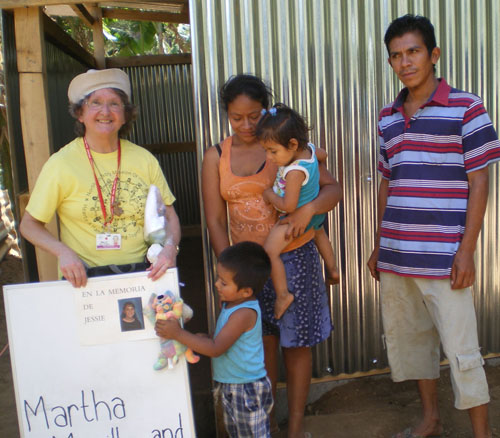March 26, 2014 By Shan Moore Running to his father, the child told him excitedly in Spanish: "My aunts and uncles are bringing us food!" That boy, maybe three or four years old, had looked upon him and the other North Country Mission of Hope volunteers not as strangers, nor just benefactors, but as family. "The wisdom that was unfolding (within the group) at the time was really about global awareness, global community," said Dominican Sister of Hope Sister Debbie Blow, who is Mission of Hope (MOH) executive director. Sixteen years of bringing aid to the poor in Nicaragua has built a bond that furthers that global aim bit by bit. "They are so happy to see us — and they don't forget our faces," said Sally Kokes, a parishioner of St. Augustine's in Peru, who make her third MOH trip in February. The student she sponsors, a 16-year-old named Gilbert, "spotted me first this year," she said. And Gilbert, for the first time, was able to converse with her in her own native tongue. "A year ago, he could hardly say hello in English," she said. Much accomplished Nicaraguans pitch in where they can, especially building home shelters, and it's something MOH encourages. "They lose their sense of self worth, they lose their pride." There is a lesson in that for the missioners. Another, Mrs. Kokes said, came from a little boy who was playing with a truck made from scraps of wood. She couldn't help but think about two big red trucks in her attic that her grandchildren had once played with. "It's sad, and it's very overwhelming," she said via cellphone in the midst of the recent mission. "We write in our journals and that helps to get your feelings off your chest." Leagon, on a path to enter seminary in the fall, relied on faith as he witnessed the depths of the destitution. At the same time, he sees God in the poor of Nicaragua and is uplifted by them. "These people have absolutely nothing," he said, (but) even in the midst of that poverty, the absolute joy ... they exhibit can only come from their faith. "In our country, you never see that," he mused. "It shows possessions are not where happiness come from." Returning home hard "When I see the people, who with nothing monetarily can be so happy as long as they have their family and their faith, I really believe that's what it means when God says he'll take care of us,” she said. "He doesn't necessarily always give the (material) things people need, but he puts somebody in their path who can help." Returning home isn't easy. Back in Peru, the aspects of life she takes for granted -wasting time, wasting resources, the American's habit of acquiring stuff they don't really need - hits her in the face as she thinks of how little in material goods Nicaraguans have. "You have to kind of re-immerse yourself," she said. "I get really crabby." Leagon has not eaten in his school cafeteria since returning from mission in 2013. "There's so much waste," he said. "The amount of food waste and waste in general that we have every day is staggering when you come back from a place that has nothing." To help Mission of Hope
Photo Provided |
||||


